|
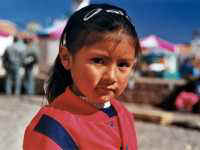
Although the trip in in Bolivia started in Santa Cruz, the first
pictures here are shot in Sucre.
Santa Cruz is a very nice city to start your trip. I wish I had stayed
there longer. Anyway, the alternative was a connecting flight to Sucre and
that can't be considered as a punishment as these pictures will show.
|

|
|
|
|
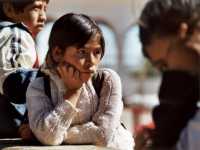
The first impression of Bolivia is a good one. The people are very
photogenic and that's something that strikes me at once. The next thing is
shooting every soul that one encounters. And that means business for Fuji
(my favorite film brand this year).
|
|
|
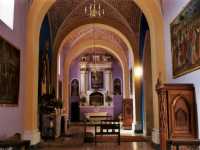
Just when we explore the city, we run into a procession in honor of
Santa Anna. The epic-center of all festivities is a church on a hill in
Sucre.
This picture shows the side-wing of this church. Meanwhile there is a
mass going on and the church is very crowded, also with a lot of children.
The side-wing is abandoned, as can be seen here.
|

|
|
|
|
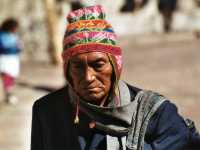
Outside the church many people gather on the main plaza. Here you can
buy local food, and enjoy the fair.
This man just returns from work.
|
|
|
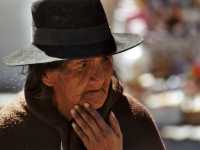
Although it is not cold in Bolivia according to Dutch standards, many people
here think it is. They even put cloths on their dog!
Most people cover their head. It is because of
the burning sun. At this altitude the sun is very harsh. This woman is
waiting for the procession. She hopes to sell food and drinks to the
church attendees.
|
|
|
|

|
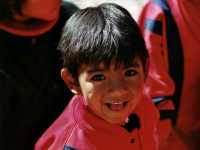
And then of course the school children also await the procession. They
are delighted to play such an important role. The teachers try to keep
them amused on the plaza.
And finally the procession starts to move outside, across the plaza and
all children join the group. |
|
|
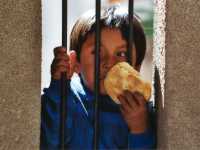
But not every school is involved in the festivities. This little man
has to stay at the schoolyard, while eating his dinner. A penny for his
thoughts...
|
|
|
|
|
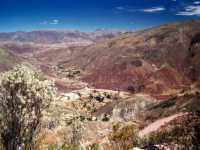
The other day we leave for a journey to Potolo. We leave Sucre and
travel through the Andes mountains. Here we drive through a very colorful
valley. The mountains vary from dark red to light green. The green
soil is caused by a rich concentration of copper. The dark red color is
due to metal.
Geologists assume that a meteor crashed here a long time ago, otherwise
they don't have an explanation for the strange landscape.
|
|
|
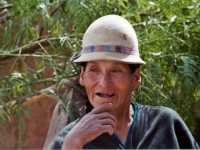
The objective of our journey is a visit to Donne Ambrosa. This
woman, who lives under poor conditions on the countryside, is working on a
beautiful fabric. It is amazing to see how people can create such
extraordinary beautiful things, without buying materials. Everything is
self-made. The fabric is not shown on this picture.
|
|
|
|
 |
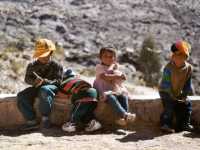
And here in the middle of mountains, far from the real world, we meet
this group of children. They are too young to go to school and enjoy
themselves while playing together in the sun.
|
|
|
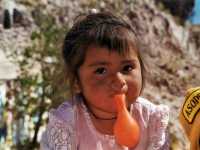
Children here are very fond of our toys. Balloons are always a favorite
gift. But since not every child here has seen a balloon before, it takes a
lot of practice to inflate it.
|
|
|
|
|
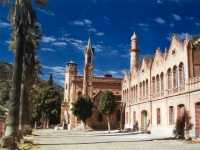
On our way to Potosi we imagine the cold that will bother us when we'll
arrive there. But first we go to a military base. Here is the Gloriėtta,
an old country-house of a rich Bolivian family that had adopted 100
children.
The building on the right hand contained all the children. Now the
Glorietta is restored by the Bolivian government and tourist entrance
fees.
|
|
|
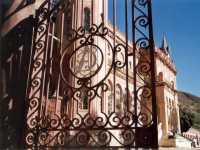
The Gloriėtta is a beautiful building with many styles from around the
world. Try to visit this building if you can. It's certainly worthwhile.
|
 |
|
|
|
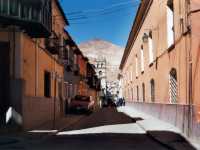
Potosi was one of the richest cities in former days. And all because of
Cerro Rico, the mountain here in the background. A tremendous lot of
silver and other minerals were found in this mountain. The famous
"Silver Fleet" of ancient Spain originated here. Around
8.000.000 miners (!) have found their death in this mountain.
Now you can still visit the mines. The mines are still operational, by
private companies. Also go to the museum Casa Monreal where you can learn
more about the fascinating history of Bolivia.
|
|
|
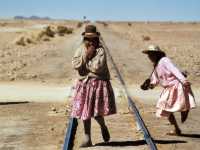
And then our journey goes on to the place we fear and look out for,
Uyuni. But more about that at the next picture.
On the way to Uyuni we visit the little village Calchani,
where very poor families earn their money by preparing salt for
consumption. Calchani is located near the railroad to Uyuni; this railroad
is still used. But luckily enough not at the time that this picture was
taken.
|
|
|
|
 |
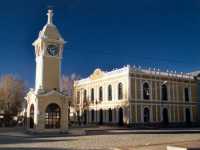
This is Uyuni, one of the coldest places you can visit in
Bolivia at 4.000 meters. During our visit it the temperature is -10
Celsius. One week before it was even -30 C.
There is not much to see in Uyuni, but it is one of the
few resorts you can stay before you explore the great salt plain of Uyuni.
|
|
|
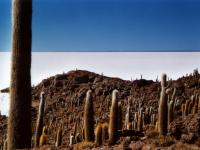
The salt plain (Solar de Uyuni) is a huge 12.000 km2 plain
at an altitude of 4.000 meters. The massive plate was a sea once. During
the evolution of the earth it was lifted to the altitude. The seawater has
been vaporized and only sea salt left as a witness.
In the middle of all this salt we visit Isla Pescado. This coral Island
houses very huge cactuses. Some are 12 meters high! If you are lucky you
might see chinchilla's on the Island and flamingos in the air!
|
|
|
|
|
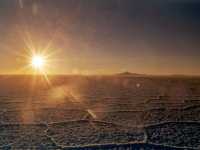
When I took this picture, I had a very weird experience. As long as the
sun was shining it was quite warm. But after the sunset the temperature
dropped with at least 10 degrees Celsius within a few minutes!
At night you see the most beautiful sky you can imagine. At this
altitude with such a dry sky, you see many stars. The stars even shine at
the horizon. You'll see many falling stars and satellites.
|
|
|
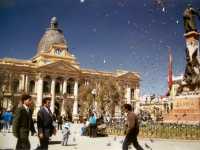
In Uyuni it is so cold that it's not very advisable to take a shower.
Your body (or parts of it) will shrink to microscopic levels. So when we
arrive in La Paz it is fantastic to be able to take a shower again.
And even Mc Donalds is a first class restaurant.
These pictures are taken on Place Murillo in La Paz. Just sit here,
feed the pigeons and enjoy everyday live. Watch out for thieves!
|
|
|
|
|
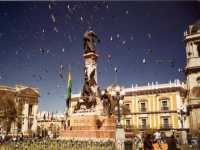
Here at the background (the yellow building on the right) you see the
Presidential palace. It's located at Place Murillo. In the past, two
president's have been killed here on this plaza.
|
|
|
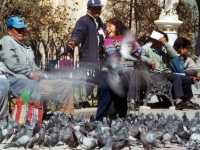
This girl enjoyed feeding mice to the pigeons. There are so many people
who feed these flying rats, that it is amazing that they are always
hungry.
|
 |
|
|
|
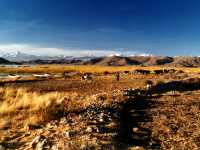
After La Paz our journey went to Puerto Perez at Lago Titicaca. Here we
stay in a very luxurious hotel. The landscape here is beautiful. The
tranquility is overwhelming.
The farmer on this picture has a problem with the cow. The cow run very
hard towards the lake. The farmer had to run like Roadrunner and nearly
fell. He was not amused afterwards and blamed me, the "Gringo"!
Sometimes it's so obvious that you are the one who is too many!
|
|
|
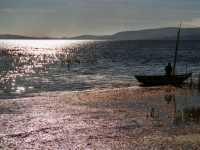
So I go on to my next target. This time it's a fisherman who collects
reed from the lake. The sun is descending fast now, so I have to move on
to my next target.
|
|
|
|
 |
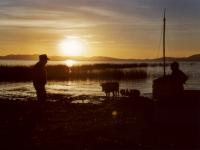
And there I find the perfect shot. A fisherman and his
wife. It's sunset and the couple collect all their tools and animals,
before it becomes completely dark.
The (mad) cow at the background is the only cow that I have ever
seen swimming! It was incredible she could swim many styles.
The journey through Bolivia ended here. But another great
journey is just about to start. Because tomorrow we go to Peru !
|
|
|

Click me ... |


|
|
![]()